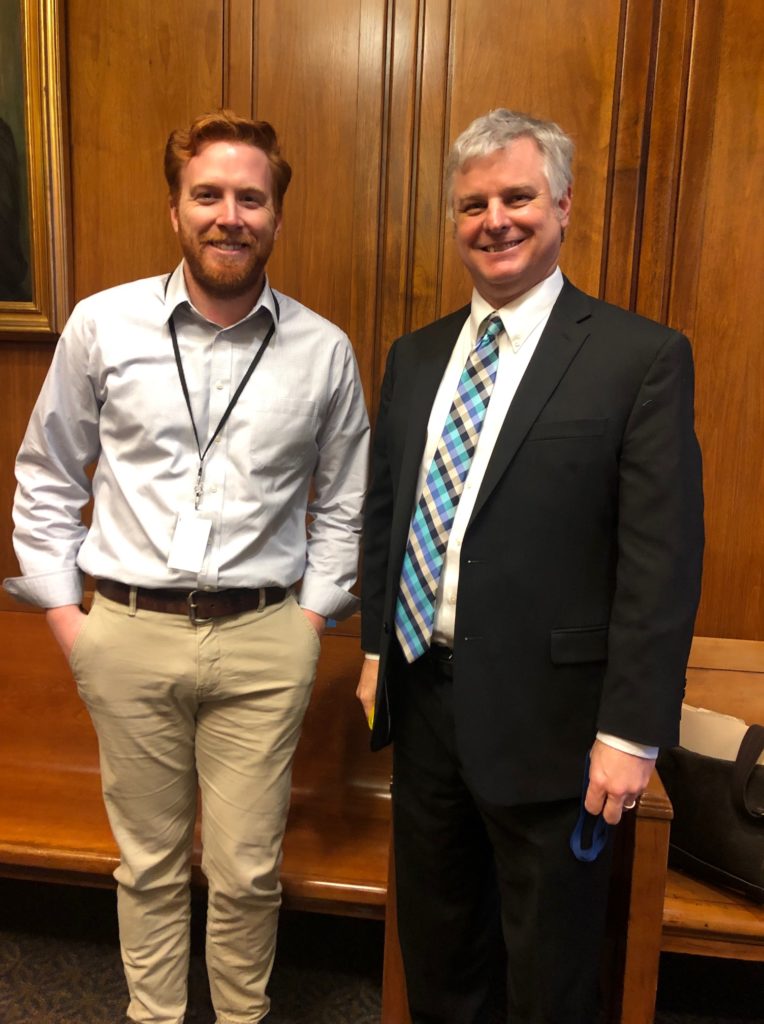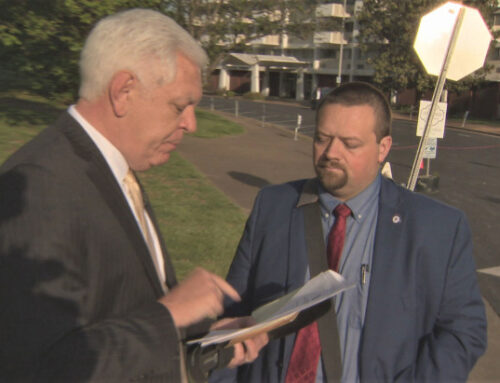The deputy attorney general for Tennessee argued in court this week that reports by consultant McKinsey and Co. regarding the re-opening of Tennessee and other government responses during the COVID-19 pandemic are exempt from the public records law because revealing them would open up the executive branch to second-guessing by the public.

Stephen Elliott, a journalist with the Nashville Post, and his attorney Paul McAdoo, the Tennessee-based attorney for Reporters Committee for Freedom of the Press Local Legal Initiative, pause after the hearing in a public records case. Elliott is challenging the state’s denial of access to reports from consultant McKinsey and Co. related to the state’s response to the COVID-19 pandemic. The case was heard Tuesday, Jan. 25, in Davidson County Chancellor Pat Moskal’s court.
Nashville Post journalist Stephen Elliott filed the public records lawsuit after 20 months of trying to obtain the reports. The reports were commissioned by state government in a multi-million contract and, among other things, outline facts and potential scenarios for the COVID-19 response, such as re-opening government and workforce management.
After Elliott’s public records lawsuit was filed on Jan. 4 — and another similar lawsuit on Dec. 17 by state employee Thomas Wesley seeking some of the same records — the state appeared to scramble to release the reports related to the state workforce. Wesley dropped his lawsuit, and a hearing was held Tuesday afternoon on Elliott’s lawsuit before Davidson County Chancellor Pat Moskal. Elliott had asked for more than the state workforce-records.
The state filed its response brief at 4:45 p.m. the day before the hearing. The brief and the state’s arguments during the hearing offered the first detailed window into its legal reasoning to withhold what many would normally consider to be public records — reports produced by a consultant for the state in 2020 that in total cost taxpayers $3.8 million.
AG argues public knowledge of COVID-19 reports would chill future state decision-making
Janet Kleinfelter, deputy attorney general for Tennessee, said that the withheld McKinsey reports and redacted material from McKinsey reports that the state did release to Elliott were confidential under a “deliberative process privilege.” She said the privilege exists to prevent “Monday-morning quarterbacking” of state decisions.
Kleinfelter argued that if state officials knew that the analyses and options presented in the McKinsey report were to be made public — even a year and a half later — state officials would be “chilled” or discouraged from having frank discussions amongst themselves about decisions they must make. Kleinfelter told the judge that state officials likely would not have hired McKinsey or sought expert advice if they thought the consultant’s reports would be released.
In explaining how it would “chill” government officials from making decisions in the future, Kleinfelter in her brief said that allowing the public to see the withheld McKinsey documents would allow “the public to probe the editorial and policy judgment and/or reconstruct the predecisionsal judgments of the UCG (Unified Command Group) and the Governor in responding to the COVID-19 pandemic and would expose those governmental officials to public criticism.”
She outlined the deliberative process privilege in her response brief noting a U.S. Supreme Court ruling that had said the “privilege is rooted in the ‘obvious realization that officials will not communicate candidly among themselves if each remark is a potential item of discovery and front page news.'”
Does privilege extend to independent contractor report?
In court on Tuesday, Moskal noted a difference in this case and previous cases in Tennessee involving a “deliberative process privilege.” In a case involving then-Gov. Phil Bredesen, the documents sought were written communications from the governor’s closest advisors to the governor, she said.
“Here it is an independent contractor,” Moskal said, observing that the contractor had even noted in its statements of work that its reports would not provide advice on policy matters.
Paul McAdoo, the attorney for Elliott as part of the Local Legal Initiative of the Reporters Committee for Freedom of the Press, argued that the public has a right to inquire about what government does.
“The McKinsey contract cost the State millions of taxpayer dollars, informed the State’s response to the COVID-19 pandemic, and has been the basis of restructuring State government, including services provided to the public,” McAdoo argued in his memorandum supporting his petition. “The public should have access to these public records so that they may fully and effectively evaluate how the State’s leaders responded to the ongoing pandemic and how it restructured State government, including the provision of public services.”
Public has a right to inquire about what government does, attorney says
In court Tuesday, McAdoo challenged Kleinfelter’s assertion that the state could only get good advice from a consultant in secret and said that transparency is an underlying principle promoting good government in that it allows checks by the public.
The government in this case wants to make decisions about how to respond to the COVID-19 pandemic without any oversight, he told the judge.
“The public has a right to inquire about what government does. To be offended by that seems peculiar.”
McAdoo also argued that the deliberative process privilege has not been recognized in Tennessee as an exception to the Tennessee Public Records Act. In Tennessee, the General Assembly established the public records law and makes the policy decisions on what records should be exempt. Some states have recognized “deliberative process” as an exemption to the public records laws in their states; others, like Florida, have not, he said.
He further said that if the court thought a deliberative process exemption did exist, it needed to “cabined in.” Factual information and post-decisional information is normally not considered “deliberative” in other states that have adopted the privilege as an exemption to public records law, he said. He noted that in one of the redacted documents given to Elliott, a checkmark and the word “underway” was next to a redacted item suggesting the state wasn’t applying the supposed privilege to “pre-decisional” things. However, because many of the documents were just released, and no list explained why various items or documents were redacted, there was no way for Elliott to understand the reasoning behind most redactions.
Judge asks how she is to determine what is deliberative
One of the first questions Chancellor Moskal asked the state during the hearing — and she returned to it more than a few times — was how she was to judge what was covered by a deliberative process privilege in the sealed records she was given to review. The state had given the judge six sets of documents and other redacted documents, which were the only remaining McKinsey documents withheld from Elliott after the state agreed to release others once Elliott obtained an attorney and the lawsuits were filed. She observed that the few court cases in Tennessee mentioning a deliberative process privilege do not give much guidance.
“Where is that line to be drawn?” Moskal asked Kleinfelter later in the hearing. “When the court was not in the room, where did they (the state’s lawyers) draw that line?”
Kleinfelter answered partly by pointing Moskal to declarations of the attorneys who had been hired by the state and who made the decisions on what to withhold — declarations by Todd Skelton and Brandon Gibson.
The state argument in the hearing and in its brief about what should be withheld basically came down to this: All McKinsey information that would “chill” state officials from robustly discussing it if they knew the public were allowed to know the information also. Though state lawyers withheld almost all of the material initially when Wesley and Elliott made public records records, the state reconsidered after the requesters hired lawyers and allowed some of the material to be produced.
Remaining documents to be reviewed by judge
According to the state’s brief, the remaining withheld documents given to the judge to review under seal were:
- “Key strategic issues to be addressed,” a two-page document;
- “Scenario planning May 29, 2020,” an 11-page document;
- “Scenario planning June 5, 2020,” an 11-page document;
- “Economic scenario planning June 5, 2020”, a 15-page document;
- “Draft THEC Tabletop Exercise Scenarios….that discusses the issues and strategies for addressing issues that might arise with respect to the educational institutions under the Tennessee Higher Education Commission, and “potential bold moves to combat COVID-19,” a 47-page document;
- “Potential bold moves to combat COVID-19,” a one-page document; and
- Several redacted documents covering issues related to “care sites,” economic relief for individuals, metrics to monitor, thresholds to trigger and inform state action, housing authority testing initiatives, COVID-19 response support, best practices, testing assumptions, healthcare system testing costs and other issues.
McAdoo noted to the judge that McKinsey had not intervened in the lawsuit seeking to keep the records confidential, indicating they apparently would not be “chilled” in producing future reports if they thought these reports were released. Kleinfelter said she agreed and that it was the people receiving the reports — the people on the Unified Command Group appointed by the governor, for example — who would be “chilled” in the future.
Privilege prevents second-guessing after decisions made, Deputy AG says
Moskal asked the state if it would consider not making the records available to the public in real-time, but available later. Does that dilute or remove any concerns of the government? she asked, observing that we know more about the pandemic now than we did at the beginning, and some of the information may be irrelevant.
Kleinfelter responded, no. If that’s the process, as soon as the emergency is over with, the records would be public and the officials would be subject to “second-guessing,” she said — which is what must be avoided and what a deliberative process privilege protects.
Moskal said she would review the sealed records, make findings of fact and give a ruling as soon as possible.
Meanwhile Elliott may still be waiting for some documents because of a snafu. In a bizarre admission, Kleinfelter explained to the judge that some of the documents that the state had decided to release after reconsideration were sent on a thumb drive to McAdoo by U.S. mail a few days before the hearing. But the package arrived to McAdoo with a hole in it and the thumb drive gone. She assured the court that this would be fixed.






